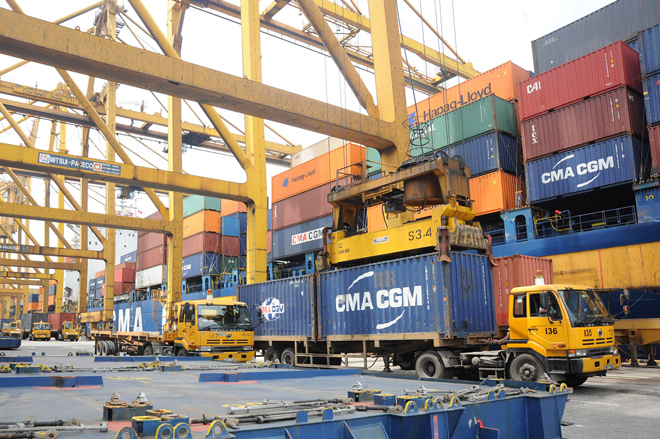Policy experts discuss Sri Lanka's policy towards building future port infrastructure.
"Sri Lanka losing out to regional competitors because of policy inconsistency," says Rohan Masakorala at the panel discussion hosted by the Advocata Institute on the topic වරාය සංවර්ධනයේ ඉදිරි දැක්ම:විකිණීමක් ද, ආයෝජනයක් ද? and the surrounding policy issues on the 12th of February at the BMICH, Colombo. This event which featured a high profile list of panelists, discussed various policy implications for port development in Sri Lanka.
Mr. Rohan Masakorala (Chief Executive Officer, Shippers Academy, Colombo) expressed strong concern that Sri Lanka is losing out to regional competition for transhipment due to a lack of policy consistency. The recent cancellation of the trilateral arrangement for the development of the East Container Terminal is reflective of this trend. Sri Lanka will only be able to protect the competitiveness of the port of Colombo by allowing global network operators to come in with their networks. According to Masakorala, providing certainty for investors by having a national consensus on these important policies is the best incentive to attract much needed Foreign Direct Investment. Mr Asanga Abeyagoonsekera, Founding Director General Institute for National Security Studies, also highlighted the importance of such consistency at the strategic level, when it comes to managing bilateral relations.
Another important takeaway from Mr. Masakorala's deliberations was that Sri Lanka should adopt the landlord model for port management as opposed to the hybrid model. He acknowledged that the success of the port of Singapore is a byproduct of following the landlord model.
Panelist Dr. Nalaka Godahewa (State Minister of Urban Development, Coast Conservation, Waste Disposal and Community Cleanliness) elaborated on the government's blueprint for port development. He highlighted that the government is determined to maintain the existing status quo of ports being managed by the Sri Lanka Port Authority while making terminal operations available for the development of the private sector and foreign investment.
Mr. Asanga Abeyagoonasekera further expounded on the geopolitical implications for Sri Lanka on the port development front. Highlighting that even countries such as Israel, which has close links with the U.S. have managed to bring in investments from China to their ports, he called for wise strategic choices and properly managed Sri Lanka's relationship with India.
The discussion was moderated by Dhananath Fernando (COO - Advocata Institute) and Sathya Karunarathne (Researcher - Advocata Institute).
The event is now available for viewing on Advocata's facebook and youtube pages. For more analysis, please visit www.advocata.org.
Key Points
- Policy Consistency in Port Development is essential if Sri Lanka is to remain competitive.
- Government’s policy to develop future port infrastructure is through private and foreign investment in terminals.
- Strategic foresight is essential to managing the various competing geopolitical interests.
- Analysing Port Development Projects through the lens of FDI will be beneficial to Sri Lanka.
Advocata is an independent policy think tank based in Colombo, Sri Lanka. We conduct research, provide commentary and hold events to promote sound policy ideas compatible with a free society in Sri Lanka. Visit advocata.org for more information.

